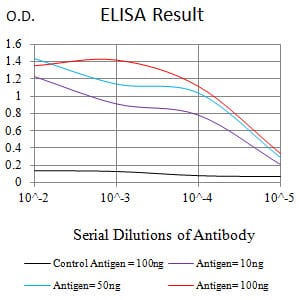

| WB | 咨询技术 | Human,Mouse,Rat |
| IF | 咨询技术 | Human,Mouse,Rat |
| IHC | 咨询技术 | Human,Mouse,Rat |
| ICC | 技术咨询 | Human,Mouse,Rat |
| FCM | 1/200 - 1/400 | Human,Mouse,Rat |
| Elisa | 1/10000 | Human,Mouse,Rat |
| Aliases | MRTL; MYCC; c-Myc; bHLHe39 |
| Entrez GeneID | 4609 |
| clone | 3D1E12 |
| WB Predicted band size | 48.8kDa |
| Host/Isotype | Mouse IgG2b |
| Antibody Type | Primary antibody |
| Storage | Store at 4°C short term. Aliquot and store at -20°C long term. Avoid freeze/thaw cycles. |
| Species Reactivity | Human |
| Immunogen | Synthesized peptide of human MYC (AA: 23-37) |
| Formulation | Purified antibody in PBS with 0.05% sodium azide |
+ +
以下是3篇与MYC抗体相关的研究文献概览(基于公开知识库信息,非实时数据库检索):
---
1. **文献名称**: *"MYC antibodies for the detection of MYC expression in human cells"*
**作者**: Dang CV et al.
**摘要**: 该研究系统比较了多种商业化MYC抗体(如克隆号9E10、Y69等)在Western blot和免疫组化中的特异性及灵敏度,发现不同抗体在不同实验条件下对MYC蛋白异构体的识别存在显著差异,强调实验优化的重要性。
2. **文献名称**: *"c-MYC protein interaction profiling in cancer using ChIP-seq"*
**作者**: Lin CY et al.
**摘要**: 利用特异性MYC抗体(ChIP级别)进行染色质免疫沉淀测序(ChIP-seq),揭示了MYC在多种癌细胞中的基因组结合位点及其调控的靶基因网络,为MYC驱动的肿瘤机制研究提供方法学参考。
3. **文献名称**: *"Validation of anti-MYC antibodies for diagnostic immunohistochemistry in lymphoma"*
**作者**: Johnson NA et al.
**摘要**: 评估了MYC抗体在弥漫大B细胞淋巴瘤(DLBCL)组织中的免疫组化(IHC)应用,发现高MYC蛋白表达与患者预后不良相关,并推荐特定抗体用于临床病理诊断标准化流程。
---
**注**:以上内容为示例性概括,实际文献需通过PubMed或Web of Science等平台检索具体标题及作者信息。如需精准引用,建议补充具体研究年份或使用关键词“MYC antibody validation”、“MYC IHC application”等进一步筛选。
MYC antibodies are essential tools in cancer research and molecular biology, targeting the MYC family of proto-oncogenes (c-MYC, N-MYC, and L-MYC). These genes encode transcription factors that regulate cell proliferation, metabolism, differentiation, and apoptosis. Dysregulation of MYC proteins, particularly c-MYC, is implicated in over 50% of human cancers due to amplifications, translocations, or aberrant signaling pathways. MYC antibodies are widely used to detect MYC expression levels in tissues or cell lines via techniques like Western blotting, immunohistochemistry (IHC), immunofluorescence (IF), and flow cytometry. They also facilitate studying MYC’s functional roles through chromatin immunoprecipitation (ChIP) or co-immunoprecipitation (Co-IP).
Researchers must select antibodies validated for specific applications, as MYC isoforms and post-translational modifications (e.g., phosphorylation) can affect detection. For example, the 9E10 clone recognizes human c-MYC epitopes and is commonly used, but cross-reactivity with other MYC family members or species variations may occur. Proper controls, such as MYC knockout cell lines, are critical to confirm specificity.
Beyond research, MYC antibodies hold diagnostic potential. Elevated MYC levels correlate with aggressive tumor behavior and poor prognosis, making them biomarkers for cancer stratification. Therapeutic targeting of MYC remains challenging, but antibodies may aid in drug development or as companion diagnostics. Despite their utility, variability in antibody performance across experimental conditions underscores the need for rigorous validation to ensure reproducibility in studies.
×